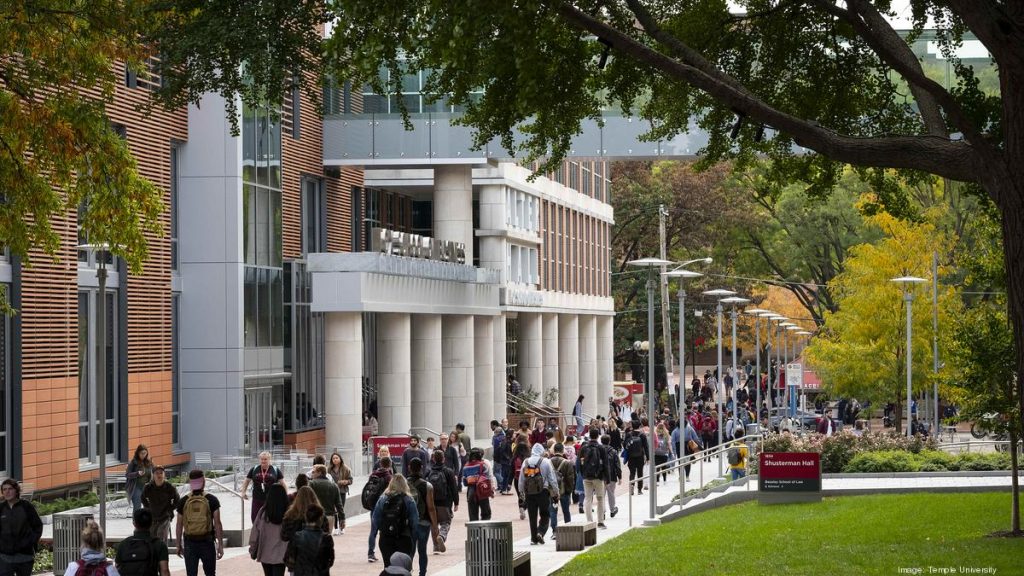Coast to coast, the biggest labor struggles happening today are happening at universities. We’ve seen it with grad workers at the University of California and adjuncts at The New School in New York.
That movement has spread to Temple University in Philadelphia, too, where I teach. Just a few weeks ago, graduate workers voted overwhelmingly to authorize a strike. But it’s not just grad workers who are organizing.
Last semester, Temple undergrads formed the Temple University Undergraduate Workers Organizing Committee, or TUUWOC. And TUUWOC is moving aggressively to unionize the thousands of undergrad workers.
If you’re a student worker at Temple University, connect with TUUWOC by clicking this link or emailing [email protected].
An Invisible Army?
Temple relies on about 4,100 undergrad workers. They do the kinds of mostly menial tasks that keep the university running from the honors center and student center to the IT offices, residence halls, and beyond.
This workforce is highly exploited. Temple provides no general data on undergrad pay or conditions: out of sight, out of mind. But when TUUWOC sent out a survey to undergrads, they found the vast majority of the students who responded work substantial hours: between 11 and 20 a week, even though many are also full-time students. The great majority are also paid very badly: between minimum wage ($7.25) and $10.99 an hour.
To give these numbers some perspective, that means most undergrad workers earn between $319 and $900 a month. In Philly, it costs a single person about $1,100 a month to stay alive with a roof over their head. But inflation in Philadelphia also spiked to around 8 percent this past year. Even that number hardly captures the reality. Last year alone, food prices in Philly went up about 11 percent; transportation costs went up about 21 percent. Inflation means cuts to real wages — eating into undergrad workers’ already low pay.
But undergrads also pay tuition. At Temple — a public university — that runs from around $17,000 to $22,000 a year (or $1,416 to $1,833 a month) for in-state residents. Out-of-state students pay a great deal more. And this past year, Temple’s leaders increased tuition 3.9 percent.
Where is all this money going? For one thing, it’s going to record profits. The last time it had to report its earnings, it reported $165,445,000 in profits (revenue over expenses).
Undergrads are helping finance a great deal of very large salaries. The Board of Trustees has made the president a millionaire (he makes about $1 million a year). But the vast bureaucracy that works for him makes well into six figures, too: vice presidents, assistant vice presidents, associate vice presidents, deans, vice deans, associate deans, and so on.
A few things are clear from all this. First, Temple simply can’t operate without its massive army of undergraduate labor — just like it can’t operate without teachers or grad workers. Second, it builds a great deal of its massive profits, and the huge salaries of its bureaucrats, on the backs of undergrads.
Standing Up, Fighting Back
But because the university runs on their labor, undergrads wield major power and leverage. Their power is palpable.
I was at a TUUWOC meeting a few weeks ago. The undergrads leading the organizing have a plan, and they’re executing it. In a conversation with some of the emerging leadership, I found myself talking to workers exploring key questions about how to not just build a union, but how to build a powerful one that doesn’t doesn’t become a top-heavy bureaucracy.
It’s probably no exaggeration to say: what labor struggle, pay, and conditions look like for all of Temple’s workers will depend a great deal on how successful TUUWOC is. Undergraduates are key in part because they are, by far, the majority of people on campus. Undergrad workers alone are a bargaining unit the same size as the entire faculty, and about five times as big as the 750-member Temple University Graduate Students’ Association (TUGSA).
If other unions at Temple, like mine (TAUP, mostly covering teachers and librarians), want to fight off the bosses, we’re going to need to support student organizing any way we can.
Temple’s trying to force a very bad deal on the grad workers. TUGSA is calling for a 50 percent raise in its pitiful wages. The university countered with 2 percent. If Temple’s bosses can force a bad deal on the grad students, that means they’ll go for TAUP’s throat. The same is true for TUUWOC.
Fighting back, and winning real gains — not giving up huge concessions — is going to mean supporting each other: teachers, grad workers, and undergrad workers alike.
We know the university is terrified that different kinds of workers will start organizing together. When TUGSA announced it might strike, very well-paid deans sent out mass emails trying to scare off teachers from joining the picket lines. My students told me they were emailed, too, asked to snitch on their striking grad student teachers. Divide and conquer is the order of the day.
That should be our clue. We have to sniff out what our bosses fear most. If it’s joining each other’s picket lines, striking alongside our coworkers and students, it’s because that’s where our real power is.
All Temple’s unions need the solidarity of student workers. That alone means the new student organizing deserves every ounce of all our unions’ support — to fight off union busting against them, to help them win a good first contract, and to help make strong student picket lines should a strike be called.
To Support TUUWOC, We’ll Have to Break Down Union Silos
Too often, our unions stay in our own “silos,” as if what teachers struggle and win — or lose — has no effect on all the other workers on campus.
At Temple, we’re going to have to find some new ways of linking up beyond the silo walls of our unions: to meet, support, and learn from TUUWOC’s undergrad organizers. And one shape that could take would be regular worker assemblies or meetings (like at the Bell Tower at the middle of campus).
That’s because we need spaces where all kinds of workers — teachers, TAs, cashiers, nurses, and all the other regular rank-and-file workers who are the majority of our unions — can meet and talk, debate and coordinate. That’s all the more important as TUGSA prepares a strike, since a real win for them means far better chances for my union, TAUP, and for TUUWOC. How can we support, how can we build good pickets, how can we keep students and teachers from scabbing? Regular assemblies would be ready-made ways to do that kind of coordination, without getting lost in the endless red tape of union bureaucracies.
A lot depends on TUUWOC. It’s time for every union at Temple — and across Philly — to throw our full weight behind them.










